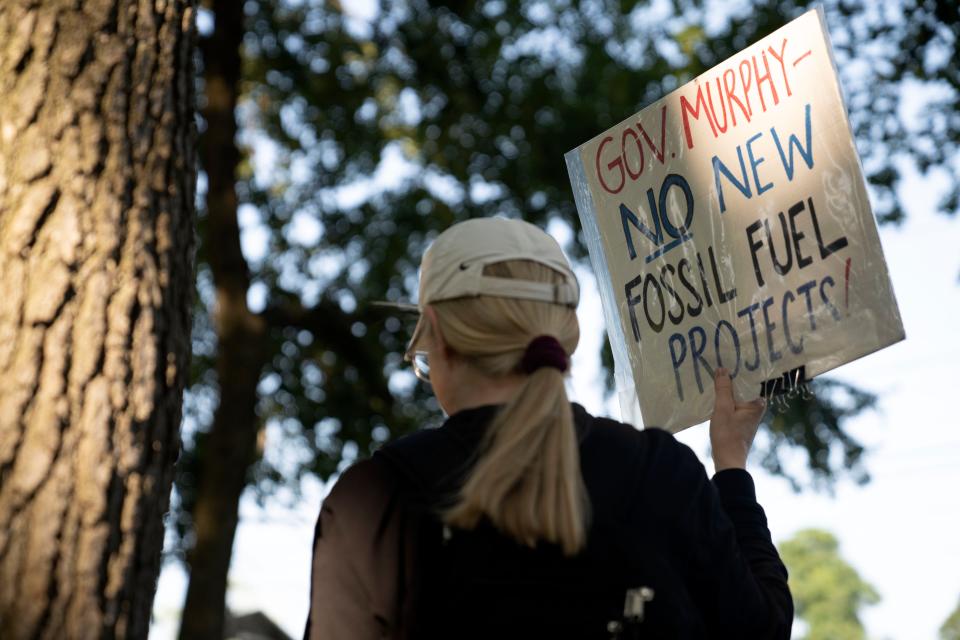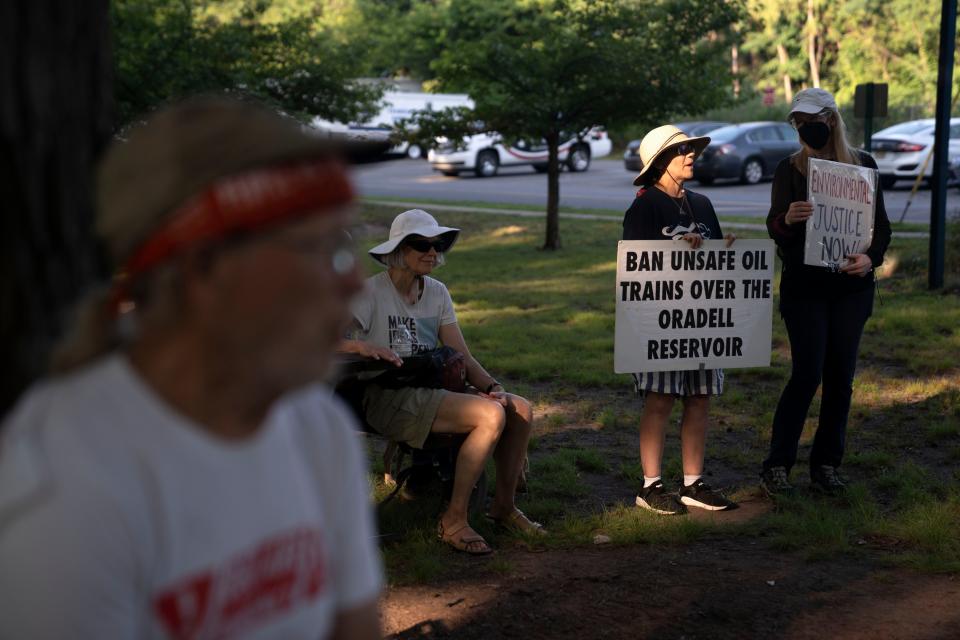'The fear never goes away': Why does NJ tolerate constant worry about oil trains? | Kelly
Paulsboro, a southern New Jersey town of about 6,100 residents that occupies 2 square miles along the Delaware River, can tell us many truths about our vulnerable world.
Eleven years ago, on the last Friday in November, a train rolled over the Jefferson Street railroad bridge that spans Mantua Creek in Paulsboro.
The A-frame bridge, which had been built nearly 100 years before and was designed to raise up to allow boats to pass underneath, had not been properly locked in place. When the Conrail train rolled over the bridge, the off-kilter tracks caused it to derail.
Four tanker cars tumbled into Mantua Creek’s lead-gray waters. One car was punctured, releasing nearly 24,000 gallons of toxic, cancer-causing vinyl chloride gas into Paulsboro’s air. A photograph from that day shows a menacing, fog-like gas cloud rolling from the bridge and down one of Paulsboro’s streets as if it were the set of a creepy horror film.
Chances are most people across America have forgotten about this accident. After all, Paulsboro is just another sleepy American river town. No one died — at least not that day. But Paulsboro's truth is that a fear of cancer is now part of life there.
The derailment of the Conrail train in Paulsboro on Nov. 30, 2012 offered a clear warning of a persistent problem that far too many American communities face: What to do when a train carrying poison crashes and the toxins suddenly invade your neighborhood? How can a town protect itself? And if cancer-causing toxins are released, by accident or just happenstance, what about the long-term impact?
No room for error in densely populated North Jersey
Those questions loomed at the center of a report this week by my colleague, Megan Burrow, who examined the dilemma faced by many crowded communities in Northern New Jersey — not to mention across the United States.
Like Paulsboro, an industrial train line with many cars carrying toxic substances rolls through more than a dozen towns in several North Jersey counties. The difference is that these towns are some of the most densely populated in America. If toxins are released, there is little room for error. Some homes and businesses are only a few dozen yards from the train line.
Understandably, local residents worry about what might happen if one of these trains derails. The evacuation plan for my hometown, Teaneck, New Jersey, which is bisected by the CSX train tracks that carry hazardous materials, shows that almost half the town’s nearly 41,000 residents might have to leave if a train derailed carrying hazardous materials. How they would escape on a moment's notice is anybody’s guess. Local roads are not designed for a mass exodus. Here, in New Jersey, gridlock is a way of life.

Such concerns have floated for decades on the fringes of life in many American towns that are home to industrial train lines — especially in the crowded urban regions of the Northeast and Midwest. And yet, state and federal governments have come up short with answers.
One reason is America’s railroads themselves. Old federal laws have made railroads virtually immune from stiffer regulations, not to mention basic scrutiny. It’s not the same protection that America’s see-no-evil gun manufacturers enjoy. But it’s close.
Federal and state efforts to impose new standards for railroad crossings have been slow — at best. The same is true for efforts to not only regulate the types of toxic substances that can be transported through heavily populated towns but merely to obtain basic information about when and how those substances actually pass through.
As Burrow noted, two laws proposed by New Jersey legislators were never even brought up for a vote. What’s striking, however, is that these proposed laws were remarkably reasonable.
Hazards on trains: Why a push to improve NJ rail safety is meeting pushback
One measure would have required industrial train lines to draw up plans for how to respond to an emergency and perhaps clean up a soiled environment. The other proposed limits on the length of industrial trains, mandated that each train would be staffed by at least two crew members and that tracks would have new emergency detectors.
Such changes hardly fit into a naïve, shut-the-factories, “Save the Whales,” uber-environment agenda — the kind that comes from far too many starry-eyed progressives — that would essentially ignore the need for industry to have a place in a modern society.
And yet, that’s just the problem.
Local towns are not asking for much. Most officials and their residents who worry about what might happen to their bucolic life if a train derailed are not usually demanding a complete shutdown of a train line.
This debate is still stuck in such basic discussion points as whether towns might be able to merely be informed when hazardous materials are passing through on a train, whether trains have a coordinated plan for emergencies and whether there might be at least two guys manning the engine of a 100-car train.
As if that’s not enough, local firefighters who would be called first to the scene of an accident don’t even know what kinds of chemicals they might be dealing with as they roll up to a train derailment. In the 21st century, this is a prescription for disaster.

Keep in mind that such issues do not touch on national security. Shipping toxins in trains does not require a “top secret” security clearance. But that’s the way this issue has been treated. The secrecy and lack of information is insulting in a nation that values open debate.
Apparently such basic requests are viewed as a major problem for train operators. A few weeks ago, CSX officials met with local officials to discuss safety concerns. But the meeting was private. The general public was not invited — not even just to listen.
Meanwhile, the federal government is little help. A new federal rail safety bill that would impose new safety standards on the transportation of hazardous materials on trains has little chance of passing in the deeply divided Congress.
East Palestine heightens fears, worry
The heightened awareness of train safety in northern New Jersey communities, which included a recent rally in a Teaneck town park, stems in part from ominous reports — and fearsome, flames-filled video — from the devastating train derailment in February in East Palestine, Ohio.
In that accident, which involved 51 cars, nearly 100,000 gallons of toxic and flammable materials spilled out, including vinyl chloride, hydrogen chloride, phosgene, butoxyethanol, benzene and butyl acrylate. Flames burned for two days. Residents within a mile of the derailment had to be evacuated.
More: Just how dangerous is the Ohio derailment disaster? Why it's confusing.
As in Paulsboro, residents now fear the long-term effects of having so much cancer-causing toxins in the air.
In recent comments to a Philadelphia radio station, Paulsboro resident Trisha Dello Iacono remembered placing towels by the doors and windows of her home in an attempt to stop the gas during the derailment in 2012.
But nothing helped. Eventually, Iacono, whose home was 4 miles from the derailment, said the air took on “like a chemical sweetness that you know something is not right.”
Iacono’s health is fine. But her son, Liam, now 12, suffers from nosebleeds and what teachers diagnosed as short-term memory loss, plus diabetes.
Are those problems connected to the train derailment? Who knows?
But as Iacono noted, “the fear never goes away.”
This sums up the gut-level fear of residents of far too many other towns across America. The fear is omnipresent. It doesn’t disappear.
Mike Kelly is an award-winning columnist for NorthJersey.com, part of the USA TODAY Network, as well as the author of three critically acclaimed non-fiction books and a podcast and documentary film producer. To get unlimited access to his insightful thoughts on how we live life in the Northeast, please subscribe or activate your digital account today.
Email: kellym@northjersey.com
This article originally appeared on NorthJersey.com: Oil train derailments in NJ: Why is it a constant worry?

